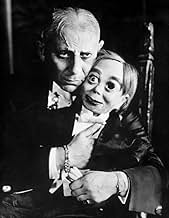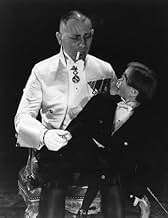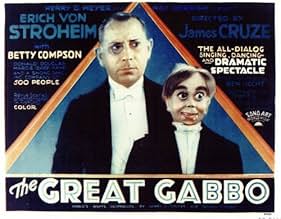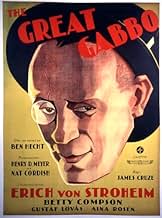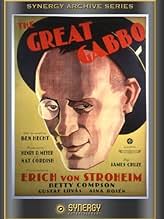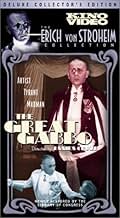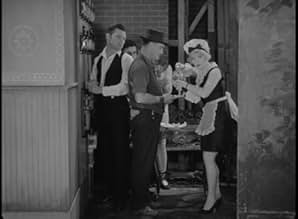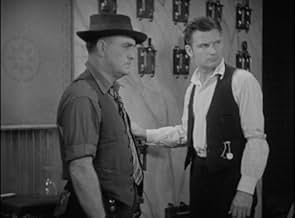PUNTUACIÓN EN IMDb
6,0/10
1,1 mil
TU PUNTUACIÓN
Un ventrílocuo enloquecido y egocéntrico está poseído por su muñeco de madera. Está enamorado de una bailarina que no le corresponde. El maniquí le da consejos para conquistarla.Un ventrílocuo enloquecido y egocéntrico está poseído por su muñeco de madera. Está enamorado de una bailarina que no le corresponde. El maniquí le da consejos para conquistarla.Un ventrílocuo enloquecido y egocéntrico está poseído por su muñeco de madera. Está enamorado de una bailarina que no le corresponde. El maniquí le da consejos para conquistarla.
- Dirección
- Guión
- Reparto principal
Erich von Stroheim
- The Great Gabbo
- (as Eric Von Stroheim)
Marjorie Kane
- Babe
- (as Margie 'Babe' Kane)
George Grandee
- Otto
- (voz)
- (sin acreditar)
Bo Peep Karlin
- Dancer
- (sin acreditar)
Rosina Lawrence
- Dancer
- (sin acreditar)
Harry Ross
- Performer
- (sin acreditar)
Eddy Waller
- Vaudevillian
- (sin acreditar)
Marbeth Wright
- Dancer
- (sin acreditar)
Reseñas destacadas
As director and actor Erich Von Stroheim did some very weird films and The Great Gabbo is certainly one of them. In this Von Stroheim is a star attraction in a Ziegfeld Follies type stage review and he is fixated on Betty Compson who used to be his assistant in his act, but walked out on him because he treated her shabbily.
Now she is keeping company with Donald Douglas a young hoofer in the show. He's actually upset as well with her interest in Von Stroheim.
In a way it's hard to review this because just the name of Erich Von Stroheim brings up images of barbaric cruelty show on the screen. The name alone is sufficient to conjure up horrible images.
So Von Stroheim wants to set up house with her and his dummy Otto. As in most ventriloquist stories the dummy functions as an alter ego.
All this with the backdrop of a Ziegfeld type show. That was interesting and like Glorifying The American Girl, The Great Gabbo is a nice filmed record of what these shows were like on stage.
Although Von Stroheim is always interesting, The Great Gabbo's best value is as a record of the type musical revue so popular back then.
Now she is keeping company with Donald Douglas a young hoofer in the show. He's actually upset as well with her interest in Von Stroheim.
In a way it's hard to review this because just the name of Erich Von Stroheim brings up images of barbaric cruelty show on the screen. The name alone is sufficient to conjure up horrible images.
So Von Stroheim wants to set up house with her and his dummy Otto. As in most ventriloquist stories the dummy functions as an alter ego.
All this with the backdrop of a Ziegfeld type show. That was interesting and like Glorifying The American Girl, The Great Gabbo is a nice filmed record of what these shows were like on stage.
Although Von Stroheim is always interesting, The Great Gabbo's best value is as a record of the type musical revue so popular back then.
THE GREAT GABBO (Sono-Art, 1929), directed by James Cruze, adapted from the story "The Rival Dummy" by Ben Hecht, stars famed director and actor Erich Von Stroheim in his talkie debut as an egotistical ventriloquist named Gabbo, or should I say, THE GREAAAT GABBO. He not only performs on stage with his dummy, Otto, (Gabbo's better half) but talks to it in his dressing room, on the street and in restaurants, with the dummy himself talking back to him, especially when Gabbo is drinking water, eating or smoking a cigarette. He has an assistant named Mary (Betty Compson), with whom he constantly finds fault in her efforts. ("My coffee is too cold/ My coffee is too hot!" etc.) During one performance she accidentally stumbles and drops a tray, which infuriates him to criticize her action, causing her to walk out on him. As time passes, Gabbo increases his fame by becoming a featured headliner in the Manhattan Revue where Mary now performs as a singer and dancer along with her new partner named Frank (Donald Douglas). In spite that he is more conceited than ever, Gabbo decides he wants Mary back with him, but something happens that will cause Gabbo to go completely insane in a dramatic climax that disrupts the show.
Aside from long stretches of dialog and no underscoring, a common practice in early talkies, "The Great Gabbo," though not considered a musical, has its share of production numbers. What makes this 1929 movie stand out among other musicals at that time is that the orchestration during the stage numbers doesn't sound at all like the usual 1920s score but more-so something from the Ziegfeld Follies. The choreography, compliments by Maurice L. Kusell, unfortunately, does not have the creativity of a Busby Berkeley, for that mainly the girls on stage simply walk back and forth carrying umbrellas, do some dancing and ballet, but there are never any closeups and the camera seldom moves or intercuts, making some of the eight to ten minute production numbers appear to be a little longer than its time length. The tunes itself, however, aren't really bad to listen to, although none of them became popular on the Hit Parade. The opening credits listing mentions sequences in Multicolor, but the entire movie itself can be seen today only in black and white.
The songs (By Paul Titsworth, Lynn Cowan, Don McNamee and King Zany) from the existing film print include: "I'm Laughing" and "The Lollipop Song-Ickey" (both sung by Otto); "Every Now and Then" (sung by Marjorie Kane and Donald Douglas); "I'm in Love With You" (sung by Douglas and Betty Compson); "The New Step" (sung by Kane); "Caught in the Web of Love" (sung by Douglas and Compton/ chorus); "I'm in Love With You" (dance number); and a finale that includes a montage of dance numbers, including the cut number of "The Ga-Ga Bird" which is shown briefly. Of all the songs, only "Caught in the Web of Love" has a slow score, but a production number that sets Douglas and Compton as human spiders dancing in front of a giant spider web. "I'm in Love With You" is one of the better songs presented in the movie, that would be sometimes edited out from some TV prints. Marjorie "Babe" Kane (famous for her role as WC Fields' daughter in the comedy short THE DENTIST in 1932) supplies some comedy, songs and taps.
THE GREAT GABBO is Von Stroheim's show all the way, monocle and all, but not the voice that accompanies his dummy, Otto. In spite of slow spots, it's an interesting drama, original in theme and premise. One wonders if Rod Serling, host of TV's "The Twilight Zone" of the 1960s, had seen this movie, since there is an episode that I recall that involves a performer obsessed by his dummy and having conversations with it, for which the dummy runs and later ruins his life and career.
I last saw THE GREAT GABBO on Cable TV's The Nostalgia Channel in the early 1990s, and it used to be one of the movies shown on Public Television's SPROCKETS back in the early 1980s. This rarely seen antique, a real curio at best, can be found on video cassette through various distributors. For a best VHS or DVD print with clearer picture and sound quality, with restored opening and exit music (but minus the reported color sequences), the best recommendation is to obtain a copy from the KINO Video Company. (**)
Aside from long stretches of dialog and no underscoring, a common practice in early talkies, "The Great Gabbo," though not considered a musical, has its share of production numbers. What makes this 1929 movie stand out among other musicals at that time is that the orchestration during the stage numbers doesn't sound at all like the usual 1920s score but more-so something from the Ziegfeld Follies. The choreography, compliments by Maurice L. Kusell, unfortunately, does not have the creativity of a Busby Berkeley, for that mainly the girls on stage simply walk back and forth carrying umbrellas, do some dancing and ballet, but there are never any closeups and the camera seldom moves or intercuts, making some of the eight to ten minute production numbers appear to be a little longer than its time length. The tunes itself, however, aren't really bad to listen to, although none of them became popular on the Hit Parade. The opening credits listing mentions sequences in Multicolor, but the entire movie itself can be seen today only in black and white.
The songs (By Paul Titsworth, Lynn Cowan, Don McNamee and King Zany) from the existing film print include: "I'm Laughing" and "The Lollipop Song-Ickey" (both sung by Otto); "Every Now and Then" (sung by Marjorie Kane and Donald Douglas); "I'm in Love With You" (sung by Douglas and Betty Compson); "The New Step" (sung by Kane); "Caught in the Web of Love" (sung by Douglas and Compton/ chorus); "I'm in Love With You" (dance number); and a finale that includes a montage of dance numbers, including the cut number of "The Ga-Ga Bird" which is shown briefly. Of all the songs, only "Caught in the Web of Love" has a slow score, but a production number that sets Douglas and Compton as human spiders dancing in front of a giant spider web. "I'm in Love With You" is one of the better songs presented in the movie, that would be sometimes edited out from some TV prints. Marjorie "Babe" Kane (famous for her role as WC Fields' daughter in the comedy short THE DENTIST in 1932) supplies some comedy, songs and taps.
THE GREAT GABBO is Von Stroheim's show all the way, monocle and all, but not the voice that accompanies his dummy, Otto. In spite of slow spots, it's an interesting drama, original in theme and premise. One wonders if Rod Serling, host of TV's "The Twilight Zone" of the 1960s, had seen this movie, since there is an episode that I recall that involves a performer obsessed by his dummy and having conversations with it, for which the dummy runs and later ruins his life and career.
I last saw THE GREAT GABBO on Cable TV's The Nostalgia Channel in the early 1990s, and it used to be one of the movies shown on Public Television's SPROCKETS back in the early 1980s. This rarely seen antique, a real curio at best, can be found on video cassette through various distributors. For a best VHS or DVD print with clearer picture and sound quality, with restored opening and exit music (but minus the reported color sequences), the best recommendation is to obtain a copy from the KINO Video Company. (**)
Though I agree with previous reviewers' comments about the good performances turned in by Erich Von Stroheim and Betty Compson, I thought the movie was disappointing overall. There isn't really much of a story, the dramatic scenes are often slow, and the rather bizarre musical numbers are poorly integrated into the plot. I'm not sure why this movie isn't classified as a musical, though; it has as many numbers as "42nd Street" and other similar titles from about the same period. Unfortunately, as a previous reviewer said, these scenes are not as creatively done as those by Busby Berkeley; the choreography is often unappealing, and the dancers don't look very well-rehearsed, though there are some bright spots.
Interestingly, the contemporary "Variety" review mentioned a color sequence in the film, which was not present on the Video Yesteryear VHS copy I watched. I wonder if this piece is lost, or available on other editions?
Interestingly, the contemporary "Variety" review mentioned a color sequence in the film, which was not present on the Video Yesteryear VHS copy I watched. I wonder if this piece is lost, or available on other editions?
This is a strange little number because it's a pretty dark subject matter, which at times is pretty chilling to watch, but then they throw in lots of songs. I'm not too sure what the Directors were going for when they filmed this. I say this because it's evident, at times, that quite a few scenes were added later... and I cannot figure out why.
I really like the idea of the mad ventriloquist. In this stories concept, he is in love with his assistant, Mary (Compson), though finds it hard to fully converse with her. As The Great Gabbo (Erich von Stroheim), as he sees himself, he's nasty, offensive, and disagreeable. However, when he speaks through the dummy he can be loving and charming. It's this fissure that eventually leads to his mental breakdown.
I know that the musical moments are there because it's set in the vaudeville and theatre life, though for most of the time these feel more like padding - filling out time. I think this could be remade and be an actually powerful movie. Reduce the musical side and expand on the breakdown. There are times in this movie where chills ran down my spine. The part where Mary walks out on The Great Gabbo and the Dummy calls her softly back, to be reprimanded by Gabbo is both heartbreaking and creepy as hell.
The film, in general, is entertaining, though I have to say I found the number of musical intermissions too much. These are also 1920's musicals so are not so relevant today. Also, the dancing isn't up to par with bigger productions. Though I have to say the scene where Mary throws herself off a giant spiders web to be caught inches from the ground is breathtaking. I would say, for all creepy doll fans and those who like a psychological edge to their dramas, it's worth a watch.
I really like the idea of the mad ventriloquist. In this stories concept, he is in love with his assistant, Mary (Compson), though finds it hard to fully converse with her. As The Great Gabbo (Erich von Stroheim), as he sees himself, he's nasty, offensive, and disagreeable. However, when he speaks through the dummy he can be loving and charming. It's this fissure that eventually leads to his mental breakdown.
I know that the musical moments are there because it's set in the vaudeville and theatre life, though for most of the time these feel more like padding - filling out time. I think this could be remade and be an actually powerful movie. Reduce the musical side and expand on the breakdown. There are times in this movie where chills ran down my spine. The part where Mary walks out on The Great Gabbo and the Dummy calls her softly back, to be reprimanded by Gabbo is both heartbreaking and creepy as hell.
The film, in general, is entertaining, though I have to say I found the number of musical intermissions too much. These are also 1920's musicals so are not so relevant today. Also, the dancing isn't up to par with bigger productions. Though I have to say the scene where Mary throws herself off a giant spiders web to be caught inches from the ground is breathtaking. I would say, for all creepy doll fans and those who like a psychological edge to their dramas, it's worth a watch.
This film about a ventriloquist who lives a self-imposed life of lonliness because of his personality is absorbing, different, and dated. Shortly produced after The Jazz Singer(1927), the film is an early talkie with all the characteristics of an early talkie. It has somewhat stilted stages, little camera movement, and most annoying, a bunch of Busby Berkley type musical numbers that have little to do with the plot. All that notwithstanding, the lead role of Gabbo, a man who lives to be successful no matter what it takes, who is willing to forsake personal happiness to achieve, who runs the scope of emotions in minutes, is played with gusto by that wonderful actor(and even greater director) Erich Von Stroheim. Von Stroheim uses all his European charm(and decadence) as the man who shares life and lives with and through his dummy Otto. There are no supernatural aspects about the relationship with Gabbo and Otto. The movie is in no way a horror picture(although very often advertised as such). It really is a story of the problems a man has exhibiting his emotions, living with others, and living with himself. Some of the scenes are very well-done, including the last shot as we see Gabbo avoid a ladder. The rest of the cast is effective with Betty Compson as a love interest doing a fine job, and Donald Douglas as a lead singer/romantic figure being absolutely absurd. If for no other reason, see the film to see Von Stroheim in action. There was no one like him.
¿Sabías que...?
- CuriosidadesThe dummy Otto was a hand carved basswood Frank Marshall figure. The same man who designed Edgar Bergen's famous characters Charlie McCarthy and Mortimer Snerd.
- PifiasOverlooking the seeming impossibility of Gabbo having Otto the Dummy speak while Gabbo is eating, smoking, and drinking, Otto's head and mouth move with the words and music when Gabbo is at least six feet away.
- Versiones alternativasEl gran Gabbo (1929) was originally released by Sono Art-World Wide Pictures, with certain sequences were presented in Multicolor. However, current prints, restored by the Library of Congress and released by Kino International on DVD, exist only in black-and-white. Most, perhaps all, VHS and DVD releases of the film have the color sequences in black and white.
- ConexionesEdited into The Girl from Calgary (1932)
- Banda sonoraEvery Now and Then
(uncredited)
Written by King Zany and Donald McNamee
Performed by Marjorie Kane and Donald Douglas
Selecciones populares
Inicia sesión para calificar y añadir a tu lista para recibir recomendaciones personalizadas
Detalles
- Duración
- 1h 32min(92 min)
- Color
Contribuir a esta página
Sugerir un cambio o añadir el contenido que falta

